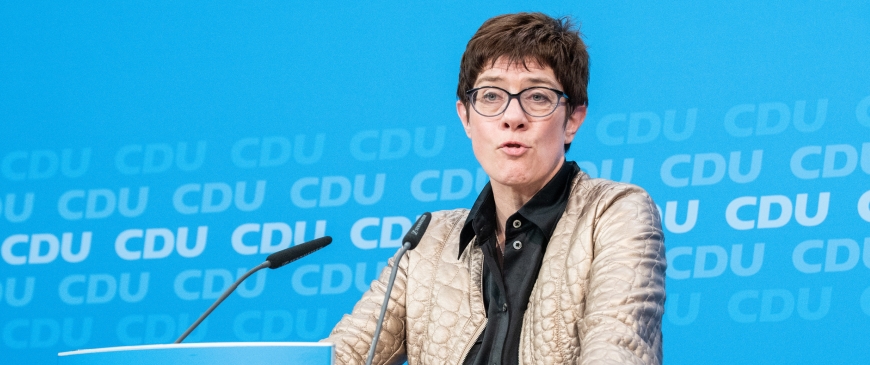
Annegret Kramp-Karrenbauer’s election offers no cause for Macron and the EU to celebrate
The election of Annegret Kramp-Karrenbauer as the new leader of the governing Christian Democratic Union (CDU) party suggests there will not be any immediate shift in Germany’s lukewarm approach to French proposals for eurozone reform if she also succeeds Angela Merkel as Chancellor.
After a string of poor regional election results and quarrels within the conservative camp that had eroded her authority in Berlin, Merkel announced in October that she would stand down as party leader and would not stand again as Chancellor at the next elections (nominally in 2021). In an unusually fiery contest for the CDU that had been almost lulled to apathy by eighteen years of Merkel’s leadership, AKK -as Kramp-Karrenbauer is known locally in Germany - prevailed over arch-conservative Friedrich Merz and the nationalist-leaning current health minister, Jens Spahn.
AKK’s outlook on Europe is shaped by her Catholic upbringing in the Saarland, a small state on Germany’s border with France which had been a French protectorate after the Second World War. She is fluent in French and said to look favourably on many of French president Emmanuel Macron’s reform proposals. As such, she stands in the tradition of West German Catholic leaders like Konrad Adenauer from Cologne, who have looked across the Rhine to France as their natural ally in building the EU.
But during the leadership campaign, she said very little about EU reform, reflecting the inward-looking nature of German politics at the moment. Previously she was quick to endorse Macron’s call for a European army and supported Merkel’s decision to keep Greece in the euro in 2015, but during the CDU leadership race she steered clear of controversial proposals like the eurozone budget. Like much of the German establishment, she has moved on from Brexit debate and made the case for a pragmatic and constructive relationship with Britain in the future.
AKK has given no indication that she wants to redraw any of Germany’s red lines that (coupled with the recent opposition from the Hanseatic League) have proved a major obstacle to progress on Macron’s EU reform proposals. Her background suggests she might provide greater rhetorical support and soften Germany’s approach at the margins, but AKK is neither a visionary nor has she sought a mandate for far-reaching reforms.
To make matters worse for Macron’s European ambitions, German politics is likely to remain preoccupied by domestic affairs in the immediate future due to the fragility of the grand coalition between the CDU and the Social Democrats (SPD). The election of AKK might well be the final straw for the SPD to pull out of government as her credentials as economic progressive will make it even harder to distance itself from the CDU.
Should that happen, the CDU could then attempt to negotiate with the Greens and the liberal Free Democratic Party (FDP) to form a new government; a second attempt to form a “Jamaica” coalition for which negotiations failed under Merkel at the end of last year. But as the Greens have surged in the polls since the last election, they would likely be unwilling to assume the junior position in a conservative government.
So, depending on the twists and turns of domestic politics, Germany could return to a more traditionally integrationist role in Europe. But in the short term, the election of AKK does not bode well for the progress of much-needed EU reforms.
That suggests Macron will have no European victories to help offset the problems he faces on the home front. Macron and others made a mistake in looking to Germany as a driving force for reform, which is unlikely to change under a new conservative party leader for the foreseeable future.
Sophia Besch is a research fellow at the Centre for European Reform. Leonard Schuette is the Clara Marina O'Donnell fellow at the Centre for European Reform (2018-19).
